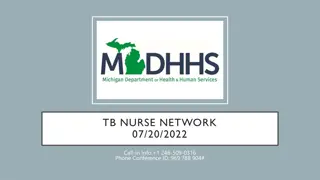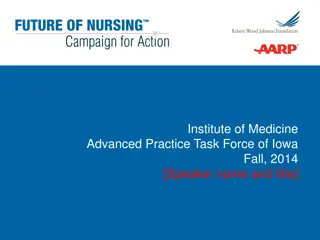
Understanding the Nurse Practice Act: Importance and History
Explore the significance of the Nurse Practice Act (NPA) in safeguarding patient health and regulating nursing practice across different states. Learn about the critical role of the NPA in ensuring the competency and safety of nurses, along with its historical evolution and the state's responsibility in enforcing healthcare standards.
Download Presentation

Please find below an Image/Link to download the presentation.
The content on the website is provided AS IS for your information and personal use only. It may not be sold, licensed, or shared on other websites without obtaining consent from the author. If you encounter any issues during the download, it is possible that the publisher has removed the file from their server.
You are allowed to download the files provided on this website for personal or commercial use, subject to the condition that they are used lawfully. All files are the property of their respective owners.
The content on the website is provided AS IS for your information and personal use only. It may not be sold, licensed, or shared on other websites without obtaining consent from the author.
E N D
Presentation Transcript
Libyan International Medical University Faculty of Business Administration Nurse Practice Act By : Sondos Aloud ID : 1500
TABLE OF CONTENTS 04 01 02 03 05 INTRODUCTION IMPORTANT OF NPA CONCLUSION HISTORY OF NPA THE STATE S ROLE
TABLE OF CONTENTS 06 REFERENCE
INTRODUCTION The NPA is a rule designed to protect patients' health and to define the scope of practice for all ensuring that nurses are qualified and capable of doing their job. Every state has some version of a Nurse Practice Act that sets the legal parameters for what nurses can and cannot do within their jurisdiction. Nurses in each state should take the time to learn the details of the laws regarding their state. levels of nurses,
HISTORY Before regulations governing the practice of nursing existed, nurses were more or less freelance artists. Anyone could offer their services as a nurse without having previous training or a recognized skill set. This was a dangerous practice, and it endangered the health of the public. nursing organizations were established and before In the early 1900s, there were over 400 training schools for nurses. Individuals who were actually trained as nurses started to organize. The New York State Nurses Association was one of the first organizations of trained nurses. It was this organization that championed the idea that trained nurses should be registered as a matter of public safety. In 1904, North Carolina became the first state to enact a nurse practice act. One of the tenants of the act was to protect the title of Registered Nurse.
IMPORTANT OF NPA Nursing is a specialized healthcare field that requires in-depth knowledge, an array of skills, compassion, and the ability to make decisions under pressure. There are numerous fields within the nursing sector, divided by the type of client or illness. Many nurses may be contracted out to a variety of different tasks, and they need to be competent in them all. The risk of accident or mistake is relatively high, and the act was drawn up to protect patients by ensuring the highest whenever possible. level of competency
THE STATES ROLE Each state has an obligation to ensure public safety, health, and the welfare of its citizens. The licensing of healthcare providers helps to ensure public safety by identifying potential applicants becoming licensed. It forbids those without the proper training and education to perform in that role and violation of those rules is breaking the law. standards meet that must before
CONCLUSION While there are plenty of laws and legislatures that govern the nursing profession, it is up to each nurse to make sure they are fully qualified and competent. They need to keep themselves updated on any new practices or laws that concern their profession. By reading available resources put out by professional organizations, and keeping an eye on relevant journals, they can easily stay abreast of the latest and best practices.
REFERENCE Huynh, Annie P., and Lisa M. Haddad. Nursing Practice Act. PubMed, StatPearls Publishing, 2020, www.ncbi.nlm.nih.gov/books/NBK559012/. May/June 2020 - Volume 18 - Issue 3 : Nursing Made Incredibly Easy. Journals.lww.com, journals.lww.com/nursingmadeincrediblyeasy/Fulltext/2020/05000/Nurse_practice_acts_an d_the_provision_of_safe. Registered Nurse vs. Licensed Practical Nurse | All Nursing Schools. All Nursing Schools, 4 Nov. 2016, www.allnursingschools.com/articles/registered-nurse-vs-licensed-practical-nurse/. The Nurse Practice Act: Everything You Need to Know. Mississippi Lawyer Blog, 3 Jan. 2018, blog.coxwelllaw.com/nurse-practice-act/. Understanding study.com/academy/lesson/understanding-nurse-practice-acts-definition-and-impact.html. Nurse Practice Acts: Definition and Impact. Study.com, What Www.conexusmedstaff.com, www.conexusmedstaff.com/blog/2018/11/what-us-rns-need-to- know-the-nurse-practice-act. US RNs Need to Know: The Nurse Practice Act - Conexus.






















